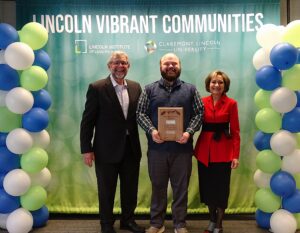Planner at CARPDC Deepens Capacity for Civic Impact Through Lincoln Vibrant Communities Fellows Program

CLAREMONT – Broxton Sanders, a Planner II at the Central Alabama Regional Planning and Development Commission (CARPDC), is among the inaugural cohort of distinguished civic leaders who have successfully completed a transformative six-month leadership program in collaboration with Claremont Lincoln University (CLU) and the Lincoln Institute of Land Policy (LILP). The Lincoln Vibrant Communities Fellows Program is dedicated to enhancing local governance and cultivating sustainable communities by offering immersive education and hands-on learning experiences for civic leaders.
“The Lincoln Vibrant Communities Fellows Program has been a deeply impactful experience for me,” said Sanders. “The opportunity to engage with public servants and deepen my understanding of the critical challenges facing our communities has been invaluable. The program equipped me with the tools to not only think strategically but also take meaningful action toward creating more sustainable, inclusive, and resilient communities. I am grateful to have been selected to participate in the inaugural cohort of the Lincoln Vibrant Communities Fellows Program. I look forward to turning what I learned into positive change through various projects across the region.”
The program, which concluded this spring with a dynamic closing event in Chicago, provided participants with extensive leadership training, policy discussions, and strategic planning methodologies. Through a combination of expert-led webinars, group coaching, and peer networking, fellows gained valuable insights into tackling critical urban challenges, including housing, climate resilience, and infrastructure.
“Lincoln Fellows now represent more than 100 communities and 38 states. In fact, the pioneer Inaugural Lincoln Fellows have paved the way for capacity building and leadership to address complex city and county issues, said Dr. Lynn Priddy, President and CEO of Claremont Lincoln University. “With key skills, policies, and innovative practices from the Lincoln Institute of Land Policy, these Fellows are poised for local impact that builds vibrant communities.”
Broxton Sanders serves as a Planner II where he advises municipalities on zoning changes, conducts community needs assessments, and drafts transportation plans for rural central Alabama. His roles guiding planning processes, engaging communities in thoughtful discussions, and advising on rural utility development further showcases his strategic thinking and dedication to community development. The Central Alabama Regional Planning and Development Commission is one of twelve regional commissions in the State of Alabama that was established to provide technical assistance to local governments in the areas of planning and development. The Commission partners with communities in Autauga, Elmore, and Montgomery Counties to support local governments in the areas of Community and Economic Development, Planning, and Housing projects, policies, and initiatives.
During the Fellows Program, Sanders had the opportunity to apply his learning to the field. Sanders collaborated with local efforts to address infrastructure issues such as drinking water accessibility and sewer service in unincorporated areas. Sanders also led engagement activities related to CARPDC’s brownfield program, introducing the program to community members and conducting interviews with site owners. Further, Sanders produced data and information related to the tri-county region for its 5-year update of the Regional Local Hazard Mitigation Plan.
Claremont Lincoln University, founded in 2011, was created to foster ethical leadership, collaboration, and respect across differences. The university develops leaders who address social, economic, and environmental challenges within their communities. An accredited, private nonprofit, Claremont Lincoln University offers programs that integrate the research, cases, and advanced practices of the Lincoln Institute of Land Policy.
The Lincoln Institute of Land Policy, established in 1974, focuses on land economics, urban planning, property rights, and policy issues related to property valuation and taxation. It merged with the Lincoln Foundation in 2006, becoming a private operating foundation.
“Our first cohort of Lincoln Vibrant Communities Fellows is wrapping up, but their work is just getting started,” said Dr. George ‘Mac’ McCarthy, President and CEO of the Lincoln Institute of Land Policy. “This program was designed to equip our fellows with the leadership skills, the hands-on experience, and the support they need to take on the biggest challenges in their communities. And now, they are ready to take home real strategies to influence policies, bring people together, and drive meaningful change across the country.”